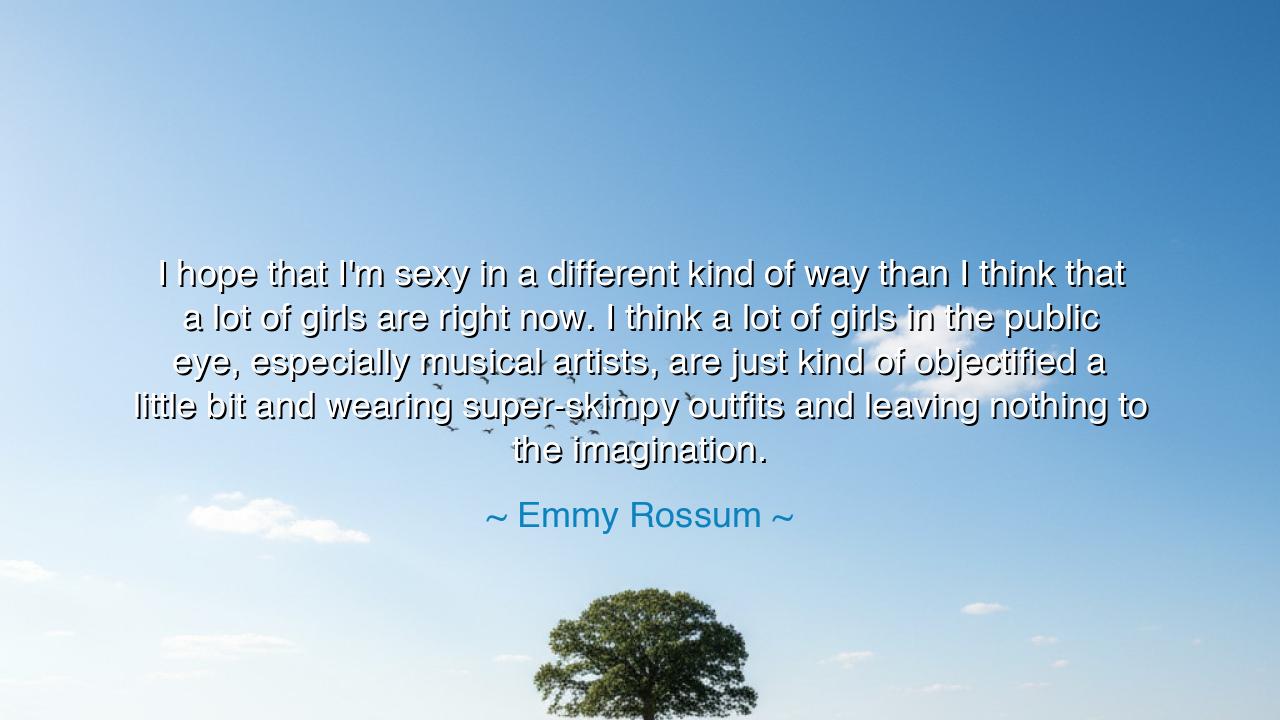
I hope that I'm sexy in a different kind of way than I think that
I hope that I'm sexy in a different kind of way than I think that a lot of girls are right now. I think a lot of girls in the public eye, especially musical artists, are just kind of objectified a little bit and wearing super-skimpy outfits and leaving nothing to the imagination.






"I hope that I'm sexy in a different kind of way than I think that a lot of girls are right now. I think a lot of girls in the public eye, especially musical artists, are just kind of objectified a little bit and wearing super-skimpy outfits and leaving nothing to the imagination." These words from Emmy Rossum offer a profound reflection on the nature of beauty, sexiness, and self-expression in a world where the standards of appearance are often shaped by external pressures. Rossum’s statement is not just a critique of how women are often objectified in popular culture, but a call for a deeper, more meaningful kind of beauty—one that engages the mind and imagination, rather than relying solely on superficial displays of sexuality.
In the ancient world, the concept of beauty was viewed not just in terms of the physical body but as something that reflected a person’s inner virtues. The Greeks, for example, revered Sophrosyne—a concept that could be translated as balance or moderation—as one of the highest virtues. Beauty, to the ancients, was about harmony, the balance between the external and the internal, and the cultivation of both physical and moral character. It was not enough for a person to possess a beautiful form; they were also required to have a noble character, one that resonated with virtue and dignity. Emmy Rossum echoes this ancient wisdom, suggesting that true sexiness comes from a deeper sense of self-respect, dignity, and the ability to inspire others through one’s whole being, not just by what is visible to the eye.
Consider the example of Helen of Troy, whose beauty, as described in Greek mythology, was so powerful that it led to the Trojan War. Yet, Helen’s beauty was not solely about her physical form—it was an embodiment of the tragic consequences of external beauty detached from inner virtue. The myth of Helen speaks to the dangers of placing too much value on outward appearance, for her beauty became a weapon used to manipulate and create destruction. It is a lesson to all who might place too much emphasis on physical allure without nurturing the deeper qualities that define true character and strength.
In the modern world, celebrity culture often reinforces this distorted view of beauty, where women—particularly in music and entertainment—are sometimes reduced to mere objects of desire. Pop culture icons, like Beyoncé, have often been celebrated not just for their musical talent, but also for their physical presence and provocative performances. Yet, even these celebrated figures, while embracing their sexuality, often confront the complex realities of being both empowered and objectified. The delicate balance between self-expression and objectification is one that modern artists like Rossum seek to navigate—using their talent to define their own sense of sexiness, rather than succumbing to the pressure of external standards.
What Rossum advocates is a shift in how we understand beauty and sexiness. True allure, she suggests, comes from a deeper place—one that is grounded in self-respect and imagination. It is not about showing more skin or wearing skimpy outfits to gain attention; it is about leaving something to the imagination, creating a sense of mystery and intrigue. In ancient times, the mysterious and the unspoken were often seen as the most powerful elements of allure. The odyssey of Penelope, for example, is built upon the idea of patient waiting, of holding something in reserve, of not revealing everything too quickly. It is through mystery and restraint that true power resides, and it is this lesson that Rossum seeks to impart: that there is power in imagination, in self-expression, and in not conforming to society's narrow definitions of beauty.
The lesson we draw from Rossum’s words is one of empowerment and respect for oneself. In a world that constantly bombards us with images of perfection and superficial beauty, it is crucial to remember that true allure is rooted in self-respect and the confidence to embrace one’s own unique beauty—both internal and external. True sexiness lies in being whole, in expressing ourselves in ways that are authentic and not dictated by the expectations of others. As Rossum suggests, the key is to not give away everything, to leave space for the imagination, to maintain an air of mystery and intrigue. This is not only about physical appearance but about the richness of character, intelligence, and creativity—qualities that inspire others and make us truly captivating.
In our own lives, let us embrace the idea that true beauty is a reflection of the whole person, not just the body. Let us strive to embody the ancient virtues of moderation, self-respect, and dignity, and let these guide our sense of sexiness. As we navigate a world that often reduces us to mere images, we must remember that our worth is defined not by how we are seen but by how we choose to see ourselves. True sexiness is not something to be given away, but something to be cultivated and protected, a power that rests in our ability to live authentically, with grace and imagination. Let us leave something to the imagination—not just in our appearance, but in how we express our deepest selves. In doing so, we will truly inspire others, as the most captivating people are those who hold the greatest mystery and depth.






AAdministratorAdministrator
Welcome, honored guests. Please leave a comment, we will respond soon